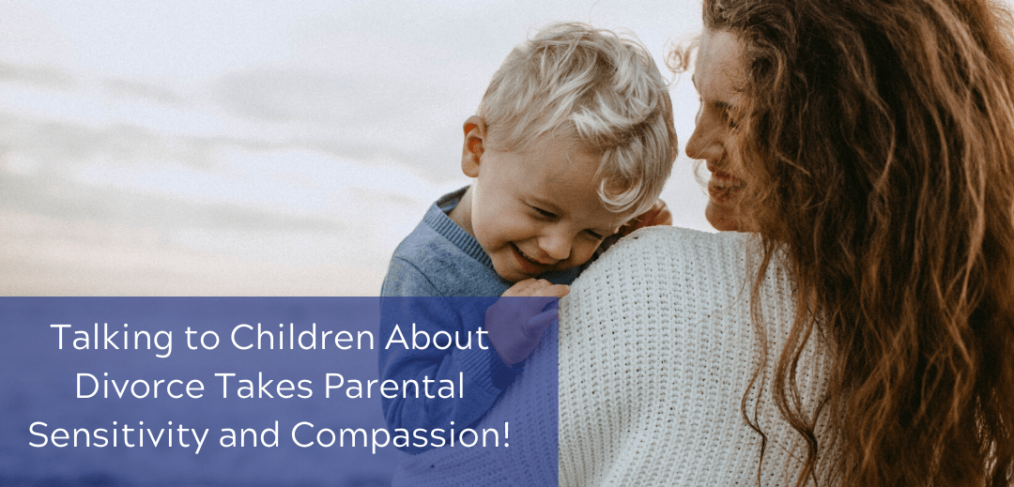
Talking to Children About Divorce Takes Parental Sensitivity and Compassion!
Talking to Children About Divorce Takes Parental Sensitivity and Compassion! Children are affected by divorce differently at different ages and in reaction to differing circumstances in their lives. But one thing’s for certain, they need to be part of ongoing dialogue about your divorce before, during and long after so they feel connected to you, safe, secure and loved.
What should you discuss with your child – and how?
Here are some important concepts and strategies to keep in mind as you share parent/child conversations about life in a family affected by divorce or separation.
- Be sure to answer questions honestly but age-appropriately. Don’t discuss adult material with your children, even teens, as tempting as it may be. Use friends as confidants, not your children.
- Be compassionate and keep an optimistic perspective. “Things may be difficult now, but they will get better. We’ll take things one day at a time. Change may seem frightening at first, but often it turns out to be a good thing for everyone.”
- Avoid creating loyalty conflicts for your child. Don’t ask them to choose sides. Ask questions with sensitivity: “I don’t want you to feel like you’re betraying your
- father/mother or like you’re spying, but tell me….”
- Avoid giving hope of reconciliation to your child. That can prolong confusion, play havoc with their emotions and may lead to behavior problems.
- Never “label” your child (a liar, brat, bad, or a problem) or say, “You’re just like your mother/father.” Children tend to become what they are labeled, or fear that if they are “just like Mom/Dad,” then maybe you will leave them too.
- Be careful not to introduce too many changes at once or too quickly. Stability is important.
- Encourage communication between your child and the other parent. If you sense a problem between them, talk about it with them. Sometimes you may have to speak up on your child’s behalf. Or you may have to give your child permission to express love for their other parent because they may feel guilty or disloyal if they do.
Your understanding and compassion towards your children are crucial during and after divorce. Put yourself in their shoes and see the world from your child’s perspective before talking with them about your expectations and changes they are facing. Be receptive to listening to their feelings and acknowledging their right to express how they feel, even when it’s not what you want to hear. When children feel heard and understood they are less likely to act out and disrespect you as the parent.
As tough as this time may be for you, remember, it’s even tougher on your kids. By keeping that in mind you will be a more effective and loving parent in the months and years ahead!
Written by: Rosaling Sedacca, Founder, Child-Centered Divorce Network
###
About the Author:
Rosalind Sedacca, CCT is a Divorce & Parenting Coach and author of the ebook, How Do I Tell the Kids about the Divorce? A Create-a-Storybook Guide to Preparing Your Children — with Love! She is also the founder of the Child-Centered Divorce Network. For more information about the book, Rosalind’s free articles, free ezine, coaching services and other parenting resources, visit www.childcentereddivorce.com.
Rachel Frawley
Latest posts by Rachel Frawley (see all)
- Finding Clarity Before the Holidays - November 3, 2025
- November 2025 – What’s Happening - October 22, 2025
- Signs You’re Ready For Divorce - October 20, 2025



